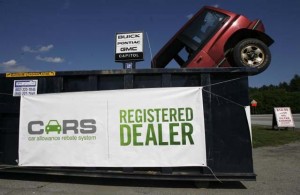
The Cash-for-Clunkers program may have been too successful for its own good, and now dealers want it halted immediately.
That didn’t last long.
Despite an infusion of an additional $2 billion in federal funds, on top of the original $1 billion approved by Congress, it appears the unexpectedly popular Cash-for-Clunkers program has again run out of money, says an auto dealer trade group. As a result, the National Automobile Dealers Association is asking that Washington halt the program immediately.
NADA fears that dealers could wind up being stuck for Clunkers cash they’ve fronted for the program if it turns out more than the total $3 billion has been spent. Officials from the Department of Transportation have acknowledged they are hugely behind in processing applications for reimbursement by dealers and have so far paid out only around $100 million, leaving many auto retailers strapped for cash.

Stay on Top of the News!
According to data released by the government Wednesday, dealers have so far submitted a total of 435,102 deals under what is formally known as the Cash Allowance Rebate System, or CARS. That has generated $1.81 billion in reimbursements to dealers who rebate either $3,500 or $4,500, depending on various factors, to customers trading in their old vehicles for newer, higher mileage models.
But using an informal survey of its 18,000 members, NADA concluded that the actual total is significantly higher and will probably drain the entire $3 billion kitty once all the deals already made have been reimbursed.
“We asked them to put a halt to the program – I think we said ‘very soon,’” the trade group’s chairman John McEleny told the publication Automotive News. NADA was hoping for an immediate cutoff, but in a “webinar” for auto industry leaders and retailers, on Wednesday, the dealer organization said it expected a cutoff won’t occur until later in the week.
The National Highway Traffic Safety Administration, which oversees Clunkers, would likely end the rebate program but give dealers a little more time to submit the papers needed to get their money back. The agency has nearly tripled the number of reviewers handling that process to more than 1,000, with still more to be added.
There are a variety of hoops that consumers and dealers must jump through to qualify for a CARS voucher. Motorists, for example, must provide proof that they have owned the vehicle they’re trading in for at least a year and provide proof it was continually insured during that period. Dealers must relay that information to the government’s reviewers, and also show that the clunker itself has been “killed,” using a sodium silicate solution to permanently disable its engine.
No one appears to have expected the groundswell of support from motorists, particularly considering that U.S. car sales have been running, so far this year, at a three-decade low. “We didn’t expect nearly as many buyers to be able to qualify for financing,” even with the Clunker cash, Mazda President Jim O’Sullivan told TheDetroitBureau.com.
That has left the government scrambling to catch up, and the tools it planned to use to advise dealers how much is left in the Clunkers bank account has proved completely ineffective. The biggest worry, NADA officials said, during their webinar, is that the fund has been overdrawn and that some dealers simply won’t get full reimbursement. At the moment, the trade group believes many retailers are on hold for more than $1 million in voucher reimbursements.
Some customers have been asked to sign agreements that they would repay dealers should the government reject their deals. But CARS overseers have warned that such contracts are illegal and that dealers who demand repayment could face large fines.
About half the 425 dealers in the Greater New York Automobile Dealers Association have decided to stop offering Clunker deals, citing fears the fund is running out. About half of the 950 dealerships in Pennsylvania have also reportedly halted doing Clunker deals, according to the Pennsylvania Automotive Association.
Several automakers, including Toyota, Honda, Ford and Nissan, have begun offering loans to help dealers cover their financial needs while waiting for reimbursement.
Nonetheless, “I know dealers are frustrated,” Department of Transportation Secretary Ray LaHood told reporters, in Washington, on Wednesday. “They’re going to get their money,” he promised.
